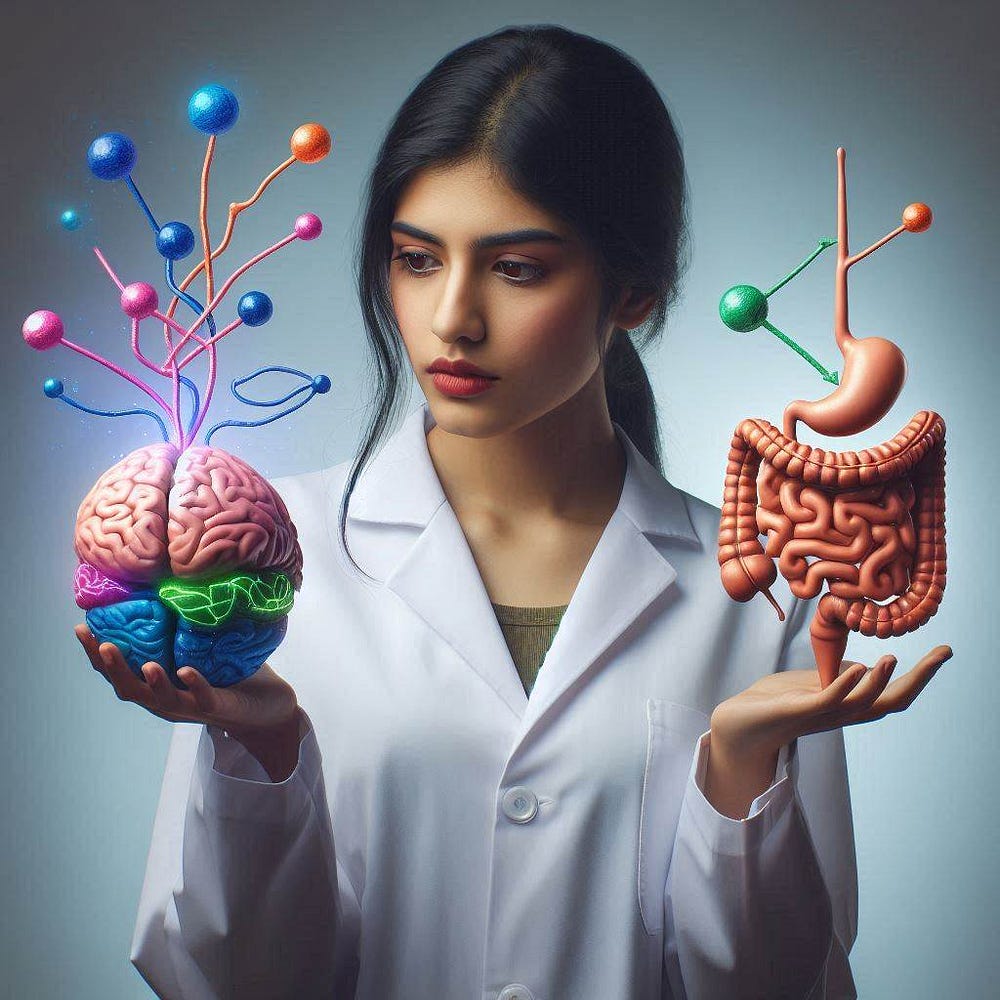Probiotics, Prebiotics, and Fiber: The Ultimate Guide to Gut Health and Vitality
The Gut-Brain Connection: How Your Digestive System Shapes Your Mood and Health
The gut, often hailed as the “second brain,” refers to the intricate network of neurons that line the digestive system, profoundly influencing our mood, behavior, and overall well-being.
Understanding the gut ecosystem necessitates an examination of the diverse community of bacteria, fungi, and other microorganisms residing within the gastrointestinal tract, each playing a pivotal role in digestion and immune function.
The term “second brain” refers to the gut’s complex network of neurons, known as the enteric nervous system, which can operate independently of the brain in our head. This gut-brain connection allows for bidirectional communication between the gut and the central nervous system, influencing various aspects of our physical and mental health.
Research studies have shown compelling evidence supporting the gut’s role as the “second brain.” For example, studies have demonstrated that gut bacteria produce neurotransmitters such as serotonin, which plays a key role in regulating mood and behavior. Additionally, the gut microbiome has been linked to conditions like anxiety, depression, and even neurodegenerative diseases like Alzheimer’s and Parkinson’s.
Furthermore, experiments involving the transplantation of gut bacteria from one individual to another, known as fecal microbiota transplantation (FMT), have shown significant effects on mood and behavior in recipients, further highlighting the gut-brain connection.
Overall, these examples and studies underscore the intricate relationship between gut health and mental well-being, solidifying the gut’s reputation as the “second brain” in our bodies.

The Vital Role of Stomach Health: Understanding Its Impact on Overall Well-Being
The detrimental effects of an unhealthy stomach can manifest as digestive issues like bloating, indigestion, and acid reflux, disrupting the absorption of vital nutrients and weakening immunity. Digestive issues such as bloating, indigestion, and acid reflux can disrupt the absorption of essential nutrients like vitamins, minerals, and proteins, leading to deficiencies and weakened immunity. Furthermore, an imbalance in gut bacteria, often stemming from poor stomach health, can contribute to inflammation throughout the body, increasing the risk of chronic diseases like diabetes, heart disease, and autoimmune conditions. Moreover, the gut-brain connection means that stomach problems can impact mental health, leading to symptoms of anxiety, depression, and cognitive dysfunction. For example, chronic acid reflux has been linked to increased anxiety levels and cognitive impairment in some individuals.
The stomach is an important part of your body for health in general, influencing factors beyond digestion such as nutrient absorption, immune function, and hormone regulation. Embracing a balanced diet rich in fiber and nutrients, practicing stress-reducing techniques like meditation, and consulting healthcare professionals when necessary are key steps to nurture your stomach’s health and enhance your overall quality of life. Let’s make conscious choices to nurture our stomachs and, in turn, safeguard our overall health and vitality.
One of the narrations that illustrates the miraculous nature of the Prophet’s Sunnah in this context is what Al-Miqdad bin Ma’di Yakrib narrated from the Prophet Mohmmad (peace be upon him) that he said: “The son of Adam does not fill any vessel worse than his stomach. It is sufficient for the son of Adam to eat a few morsels to keep his spine upright. But if he must, then one-third for his food, one-third for his drink, and one-third for his breath.” [Narrated by At-Tirmidhi, and he graded it as Hasan.]
Indeed, moderation in eating is emphasized in the hadith you provided. Despite this guidance, many of us tend to overeat, going against the principle of moderation.
The Gut Microbiome
A. Description of Trillions of Bacteria in the Gut
The gut microbiome is an expansive consortium of trillions of bacteria that work symbiotically with the human body to decompose food, synthesise essential nutrients such as vitamins B12 and K, and regulate the immune system. This heterogeneous community of microorganisms is integral to maintaining overall health and vitality.
B. Role of Gut Bacteria in Digestion and Nutrient Absorption
Gut bacteria play a crucial role in breaking down complex carbohydrates and fibers, which the body cannot digest on its own, leading to improved nutrient absorption and overall health. They also produce vital vitamins such as B12 and K, which are indispensable for overall health.
C. Impact of Gut Microbiome on Immune System
The gut microbiome plays a vital role in modulating the immune system by aiding in the identification of harmful pathogens and beneficial microorganisms, thereby bolstering overall immune function and health. This balance is vital for overall immune function and the prevention of inflammation and autoimmune diseases.

Gut-Brain Connection
A. Communication between Gut and Brain via the Gut-Brain Axis
The gut-brain axis is a bidirectional communication system that allows the gut and brain to exchange signals, influencing mood, behaviour, and overall mental health. This connection underscores the importance of maintaining a healthy gut microbiome for optimal brain function and emotional well-being.
B. Influence of Gut Health on Mental Health and Mood
Research indicates that an imbalance in gut bacteria can lead to symptoms of anxiety, depression, and other mental health disorders. Therefore, caring for your gut health through a balanced diet and probiotics can positively impact your overall emotional well-being.
Numerous research studies, including those by [ Study], have established a direct correlation between gut bacterial imbalance and the development of chronic conditions like diabetes, heart disease, and autoimmune disorders.
C. Link between Gut Health and Neurological Disorders
Recent studies, such as [explore these article
for in-depth information on the gut-brain connection and its implications for health! 🌱🧠], have indicated a potential link between gut health and neurological disorders like Alzheimer’s and Parkinson’s disease, highlighting the importance of maintaining a healthy gut for neurological well-being. Maintaining a healthy gut microbiome may reduce the risk of developing these conditions.
Factors Affecting Gut Health
A. Diet and Its Impact on Gut Microbiome
Diet plays a pivotal role in shaping the composition of the gut microbiome. A diet rich in fibre and plant-based foods promotes diversity and overall health. Incorporating fermented foods like yoghurt and kimchi can also introduce beneficial bacteria, such as lactobacilli and bifidobacteria, which play a crucial role in supporting gut health.
Boost your gut health with these nutrient-packed foods rich in lactobacilli and bifidobacteria. Dive into the creamy goodness of yogurt, teeming with Lactobacillus bulgaricus and Streptococcus thermophilus, to fortify your digestive system with classic probiotics. Savor the tangy delight of buttermilk, brimming with live probiotic cultures, for a refreshing gut boost. Indulge in the umami goodness of Miso, offering active lactobacilli to support your gut flora. Tempeh, crafted from fermented soybeans, delivers a punch of probiotics to fuel your gut health. Spice up your palate with kimchi, a zesty fermented cabbage dish bursting with beneficial bacteria. Explore the crunch of fermented pickles, unpasteurized to retain probiotic potency, for a flavorful gut-nourishing snack. Quench your thirst with kefir, a velvety fermented milk drink boasting diverse probiotic strains. and Natto, a traditional Japanese dish made from fermented soybeans, is another excellent addition to your gut-healthy diet. Rich in beneficial bacteria like Bacillus subtilis, natto offers a potent dose of probiotics to support digestive wellness. Its unique texture and robust flavor add variety to your meals while providing essential nutrients and promoting a balanced gut microbiome. Elevate your well-being by incorporating these probiotic-rich foods into your diet, fostering a harmonious balance of gut bacteria for optimal health and vitality.
B. Effects of Stress and Lifestyle Choices on Gut Health
Chronic stress and poor lifestyle choices, such as inadequate sleep and excessive alcohol consumption, can negatively impact gut health by disrupting the balance of beneficial bacteria. Engaging in stress-reducing activities like meditation and exercise can help support a healthy gut microbiome.
C. Role of Antibiotics and Medications in Altering Gut Bacteria
Antibiotics and certain medications can disrupt the balance of gut bacteria, leading to digestive issues and other health problems. It is essential to discuss potential probiotic supplements or dietary changes with a healthcare provider to help restore gut health after taking antibiotics or certain medications.

Maintaining a Healthy Gut
Importance of Probiotics and Prebiotics and Incorporating Fibre-Rich Foods in Promoting Gut Health
Probiotics and prebiotics play a vital role in nurturing a healthy gut environment. Probiotics, consisting of beneficial bacteria, work to restore equilibrium in the gut microbiome, while prebiotics, non-digestible fibers, provide essential nourishment to these good bacteria. By incorporating probiotic-rich foods such as yogurt and kefir into your daily diet, alongside fiber-rich options like fruits, vegetables, and whole grains, you can actively support and maintain a balanced gut ecosystem. Additionally, prioritizing fiber-rich foods not only promotes regular bowel movements and prevents constipation but also aids in overall gut health. Remember, staying well-hydrated with plenty of water further enhances digestion, nutrient absorption, and the overall well-being of your gut.
Strategies for Reducing Inflammation and Supporting the Gut Microbiome
Unlock the power of nature’s pharmacy to nourish your gut and tame inflammation. While fatty fish, nuts, and seeds are champions in the fight against gut inflammation, there’s a treasure trove of other anti-inflammatory foods waiting to be discovered. Dive into vibrant leafy greens like spinach and kale, bursting with antioxidants to soothe inflammation and nurture your microbiome. Indulge in the sweet goodness of berries, brimming with antioxidants and flavonoids to quell inflammation and support digestive harmony. Spice up your life with turmeric and ginger, potent warriors against inflammation, seamlessly blending into your favorite dishes to elevate both flavor and wellness. Drizzle your meals with extra virgin olive oil, a Mediterranean marvel rich in monounsaturated fats and oleocanthal, a natural anti-inflammatory powerhouse. Harness the antioxidant prowess of tomatoes, especially when cooked, to infuse your meals with lycopene’s inflammation-fighting magic. Sip on soothing green tea, brimming with catechins and polyphenols, to calm inflammation and fortify your body against chronic diseases. By embracing these diverse anti-inflammatory foods, you can cultivate a thriving gut environment and foster overall well-being.
Additional Tips for Optimal Gut Health
Embrace an alkaline diet and warm water to balance pH levels and support digestive health. Avoid processed foods and excess sugar to maintain a balanced gut microbiome and prevent health issues.
- Alkaline Diet & Warm Water: Balance pH levels, support digestion
- Hydrogen-rich Water: Aids digestion, promotes healthy gut environment
- Avoid Processed Foods & Excessive Sugar: Maintain gut microbiome balance, prevent health issues
Recap of the Gut as the “Second Brain”:
The gut, often hailed as the “second brain,” is a vital component of our overall health, influencing mood, immune function, and digestion. Prioritizing gut health through mindful nutrition, hydration, and the incorporation of anti-inflammatory foods while avoiding processed options is key to nurturing a healthy gut microbiome and reducing inflammation, thus enhancing our well-being.
Call to Action for Prioritizing Gut Health in Daily Life:
Recognizing the direct impact of gut health on our overall well-being is crucial. By actively making dietary and lifestyle choices that support a healthy gut, we can take control of our health and vitality. Let’s prioritize mindful eating, manage stress effectively, and incorporate probiotic-rich foods into our diets to unleash the full potential of our gut microbiome and experience optimal vitality.
With warm regards and heartfelt blessings,🤍
Khedija Hafsi.
References
What Is the Gut-Brain Connection? (clevelandclinic.org)
Think Twice: How the Gut’s “Second Brain” Influences Mood and Well-Being | Scientific American
Our second brain: More than a gut feeling — UBC Neuroscience
Gut Microbiota and Autoimmune Diseases: Mechanisms, Treatment,
Challenges, and Future Recommendations | Current Clinical Microbiology Reports (springer.com)
IJERPH | Free Full-Text | The Gut Microbiota and Inflammation: An Overview (mdpi.com)
7 Foods High in Probiotics and Why You Need Them (webmd.com)
Frontiers | Microbial dysbiosis in the gut drives systemic autoimmune diseases (frontiersin.org)
"🌳 Check out my TreeLinks for more helpful content! 🌿"
🔔 Disclaimer:
This content serves as general information and is not medical advice. Consult a healthcare professional before making any health-related changes.
🔔 Disclosure: As a member of LiveGood Natural Supplements,Disclosure: I may earn commissions from affiliate links, supporting this site.

Comments
Post a Comment